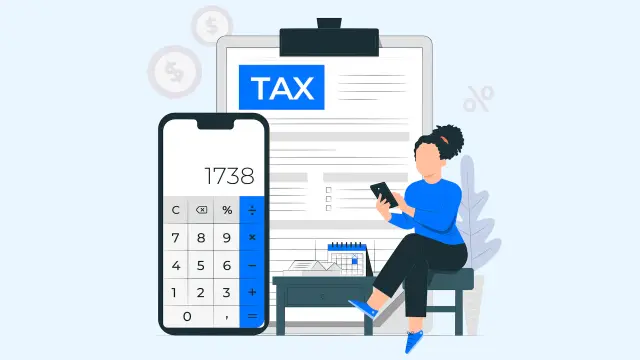Creating a Custom Accounting Software: Types, cost, security measures
Guide how to build an efficient custom accounting software

Companies are more focused on elevating their business graph through better financial performance in this fast-paced world. There was a time when accounting was just a matter of paper, but in 2022, large and small companies are using custom accounting software to automate their financial process. Why is it necessary to design custom accounting software for a company? The idea behind custom accounting software is that the existing software meets the specific business requirements that may not suit to business needs of another company. That's why most companies are looking for a more customized solution to achieve their financial targets. This guide will unveil how to build efficient custom accounting software. , the types of accounting software, its feature, security measures, and how much it costs to develop a software.

How to build efficient custom accounting software?
Software development for a business consumes time depending on the project complexity and the development process. A company can hire an in-house team, freelancers, or developers of a software development company to build its own custom accounting software. Let's deeper dive into the process of building an accounting software and save your time and money:
Step 1: Define your project idea
The first step in developing custom accounting software is to define your idea and business goals. It does not necessarily require a list of features of your potential app. However, you must have a clear vision to describe your requirements to the development team. To effectively present your project idea, you need to define your business goals, process, and the existing accounting solution.
Step 2: Select a vendor
Finding the right vendor for accounting software development can save your time and money. A software vendor is responsible for research, development, and later software maintenance. For research, you can visit listing websites like Clutch and Good firms for reviews, or you can search online on how to build a custom accounting software. After initial research, you can ask for a quote from the shortlisted vendors. For this purpose, you can create a proposal or schedule a phone call with the vendors. A good vendor will understand your software requirements and will proceed next steps.
Step 3: Plan development
At this stage, your business analyst will communicate with the software vendor to make your business needs more clearly. After discussion, your accounting software will have a technical specification. It is a document that represents the development process and software specifications like features, tech stack, and stakeholders.
Step 4: Development and Testing
Once finished with the project plan, it's high time to start the development process. According to the modern software development technique, coding and quality assurance work parallel. Each software module is tested immediately once the development completes. Testing helps to save money by optimizing the development process and mitigating software errors.
Step 5: Software deployment and maintenance
Once the development completes, you need to integrate software into business processes. To adopt this organizational change, you can seek help from your vendor for staff training by technical documentation about the features and introduction of the software. After successful software deployment, regular review, and update are crucial for maintenance purposes.
Types of Accounting Software
Each company has different needs for software development based on its business activity. For example, a company of 2-3 people does not need in-depth features for finance management. Similarly, minimal accounting software with basic features is not suitable for a large company. Next, we will showcase different types of accounting software, and the company can choose what suit its needs in the best way.
1. Spreadsheets
A spreadsheet is accounting software designed for initial finance management. Spreadsheets are suitable for companies that do not require complex financial transactions. Spreadsheets do not provide full fledge features of accounting software, so once the business size expands, you will have to ensure the use of more advanced software. Examples of spreadsheets are MS Excel and Google Sheets.
2. Commercial Accounting Software
Commercial accounting software is specifically designed to meet the needs of small and mid-size companies. This software offers a variety of features to calculate, audit, and prepare tax reports of a company. Sage Accounting is a well-known example of commercial accounting software.
3. Enterprise-level Accounting Software
Enterprise-level accounting software is designed for a large business to handle finance management and overall control. This software integrates the other modules and provides a seamless experience to control the overall workflow of a company. Moreover, it uses Big Data and Artificial Intelligence to get business insights and make predictions for the effectiveness of the business process. Xero is the best example of enterprise-level accounting software which handles complex financial transactions.
Features of Custom Accounting Software
Companies seek custom accounting software as it helps them to meet their business needs. To get a customized product, you need to consider the following things:
- Do a research
- Define your target audience
- Set your goals
- Specify your budget
- Get a quote from the development company
However, some basic features are present in almost all the accounting software. Let's take a look:
1. Invoices
This feature allows the accountants to send, receive, and keep track of invoices directly from the app. Invoices display the company logo that builds brand confidence in the market. Moreover, this feature provides more automation to set reminders for the regular invoices.
2. Tax Calculator
Tax calculation is challenging for large companies. The tax calculator calculates different types of taxes using built-in functions. Using this feature, companies can also keep track of the tax duration and avoid errors in tax calculation patterns.
3. Report generator
Custom accounting software generates reports to get insights about the business's financial performance, historical data, and forecasting based on this data.
4. Analytics
Analytics is the heart of accounting software that provides built-in visuals for a company's SWOT (Strengths, Weaknesses, Opportunities, and Threats) analysis. Moreover, companies can track financial performance and get more comprehensive reports.
5. Payroll Management
Salaries of the employees must be monitored and managed in an organized way. Accounting software calculates the total amount to be paid for a specific time period for each employee. Accountants only need to enter the hourly or monthly rates and the tax type. The software will calculate the total salary, taxes, and bonus.
6. Electronic Payments
Accounting software offers an in-built payments feature. It allows making necessary transactions from the app while keeping the record of payment history and receipts. Apart from these features, account software offers project tracking, bank account integration, and CRM integration. All these features are mandatory to embed in a custom accounting software of a company.

Security Measures
As accounting software deals with financial data, so high security is extremely important for this software. The reason is that the loss of financial data can lead to catastrophic results. For secure accounting software, you should consider the following metrics:
1. Network Firewall
A strong network firewall is a must-have to protect the accounting software from viruses and hackers attack.
2. Two-Factor Authentication
You should consider data encryption when transferring data using accounting software. For the high security of the software, it is advisable to apply two-factor authentication
when building custom accounting software.
3. Robust software logic
A robust software logic fills all the security gaps by reducing the error in the finance calculation.
How much does it cost to develop custom accounting software?
Once a company has identified a software type, it's time to figure out the developing cost of a custom accounting software. The cost of the custom software development depends on the following factors:
- Company size
- Number of features you want to add
- Security measures
- Hosting
- Number of Modules
- Design complexity
- Team members involved in the development process
The development team includes:
- Business analyst
- Project manager
- Front end developer
- Back end developer
- UI/UX designer
- QA engineer
- DevOps engineer
Accounting software is estimated to take 1500 to 2500 hours for development. So, the development cost highly depends on the hourly rates of the software company. The hourly rates vary as per the location and experience of the developing team.
For example, software development in the US can cost $100,000, but it can cost $40,000 in other countries without compromising the product quality. So, depending on the factors mentioned above, the development of accounting software costs from $1,000 to $500,000.
Final Thoughts
It is essential to build custom accounting software to deal with the financial activities of your business. We hope you are well versed in the worth of custom accounting software to automate your business process and optimize workflow. For development, you need to find a reliable vendor who will be able to provide you with the most cost-effective development services. This guide has mentioned the best online resources to find a vendor of your choice. Moreover, if you're looking for development solutions with no coding, we recommend using AppMaster. No coding skills are required to create a unique app ecosystem using this platform. Contact us to build the best accounting software to automate your company's financial activities.





